Ghandruk: A Cultural and Natural Gem in Annapurna Region
25 Apr 2025 Bishal Rijal
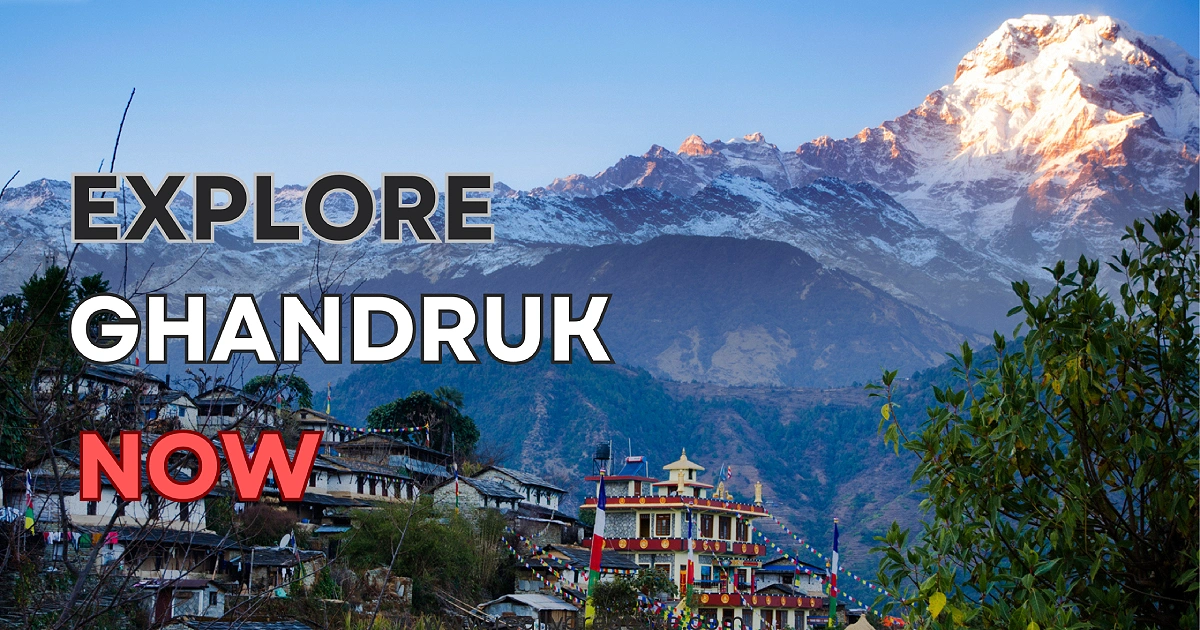
Ghandruk, a serene village in Nepal’s Kaski District, Gandaki Province, is a treasure trove of cultural richness and natural splendor. Perched at 1,940 meters (6,364 feet) in the Annapurna Conservation Area, it offers panoramic views of Himalayan giants like Annapurna South, Machhapuchhare, and Gangapurna. This comprehensive guide explores Ghandruk’s history, culture, trekking opportunities, and practical tips to help you plan an unforgettable visit.
Introduction to Ghandruk
Ghandruk is more than a stopover for trekkers; it’s a vibrant community where Gurung traditions thrive amidst stunning landscapes. Located 32 km northwest of Pokhara, it’s accessible by road or a short trek, making it ideal for families, solo travelers, and adventure seekers. Its stone-paved paths, traditional houses, and warm hospitality create an authentic Nepali experience. The village’s resilience, seen in its adaptation to the COVID-19 pandemic through farming and domestic tourism, adds depth to its appeal.
History and Culture
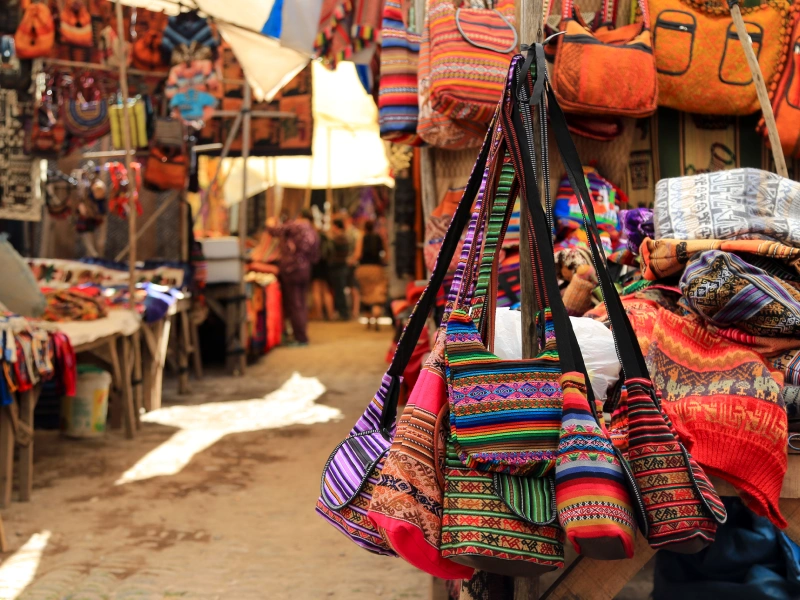
Historical Roots
Ghandruk’s history traces back centuries, with origins linked to Mongolian settlers via Tibet. The name, derived from Gurung words “ghana” (dense) and “rukh” (tree or uphill settlement), reflects its lush, elevated setting. Historically a stop on ancient trade routes between Nepal and Tibet, Ghandruk gained prominence as a recruitment hub for Gurkha soldiers, renowned for their bravery in global conflicts. The village’s 200-year-old stone houses, like the Gurung Cottage, stand as testaments to its enduring legacy.
Gurung Heritage
The Gurung community forms the heart of Ghandruk’s identity. Their compact, two-storied stone houses, built with slate roofs, are architectural marvels. Cultural practices include weaving, handicrafts, and traditional dances like “Rodhi,” performed during festivals from January to May. Music, featuring instruments like the Maadal and Flute, enlivens celebrations. The Meshram Baraha Temple, a Buddhist site, coexists with Hindu influences, showcasing religious harmony.
Museums and Cultural Experiences
Two museums offer insights into Gurung life:
- Old Gurung Museum: Displays bamboo and wooden artifacts, traditional clothing, and tools, with opportunities to try Gurung attire.
- Ghandruk Cultural Museum: Showcases household items, jewelry, and weaponry, providing a glimpse into the community’s past.
Visitors can participate in cultural shows or stay in homestays to experience Gurung hospitality, often accompanied by traditional meals like Kodo ko Roti (millet bread).
| Cultural Highlights | Description |
|---|---|
| Traditional Clothing | Men wear Bhangra, Kachhad, and black Topi; women don Gunyo Cholo, saris, and jewelry like Naugedi. |
| Dances | Rodhi and other folk dances during festivals. |
| Museums | Old Gurung and Ghandruk Cultural Museums preserve heritage. |
| Religion | Blend of Buddhism and Hinduism, centered around Meshram Baraha Temple. |
Natural Beauty and Attractions
Himalayan Vistas
Ghandruk’s location in the Annapurna Sanctuary offers unobstructed views of peaks like:
- Annapurna South (7,219m)
- Machhapuchhare (6,993m, Fishtail)
- Gangapurna (7,455m)
- Hiunchuli (6,441m)
Sunrises and sunsets over these mountains are magical, especially from viewpoints in Old Ghandruk.
Annapurna Conservation Area
Part of the Annapurna Conservation Area, Ghandruk is surrounded by rhododendron forests, home to 1,226 flowering plants, 518 bird species, and 105 mammals. The area’s biodiversity, coupled with streams and waterfalls, enhances trekking experiences. The Annapurna Conservation Area Project (ACAP), launched in 1986, promotes eco-tourism and conservation, with its field office in Ghandruk.
Nearby Attractions
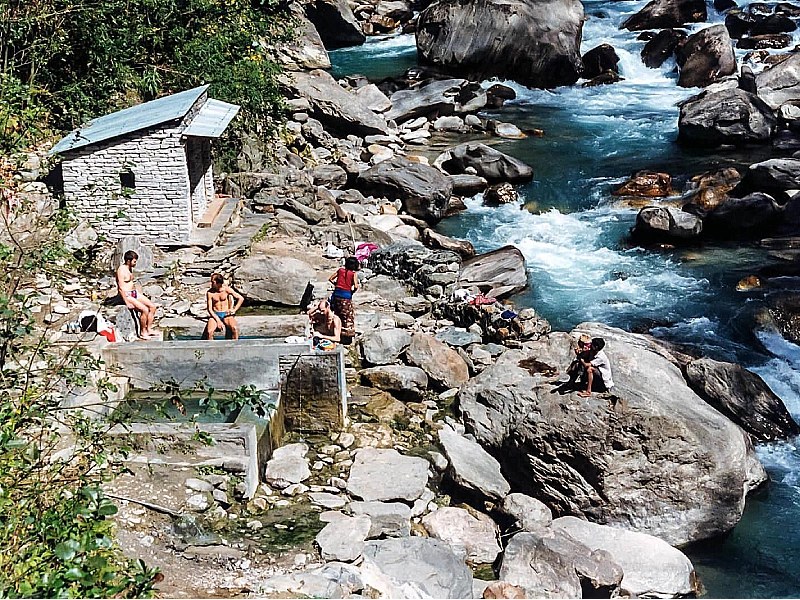
- Jhinu Danda Hot Springs: A 2-hour hike via the longest suspension bridge on the Annapurna Trekking Trail, perfect for relaxation.
- Landruk and Tadapani: Neighboring villages offering cultural and scenic experiences, reachable in 3-5 hours.
- Seuli Bazar: A local marketplace for handicrafts and groceries.
Trekking in Ghandruk
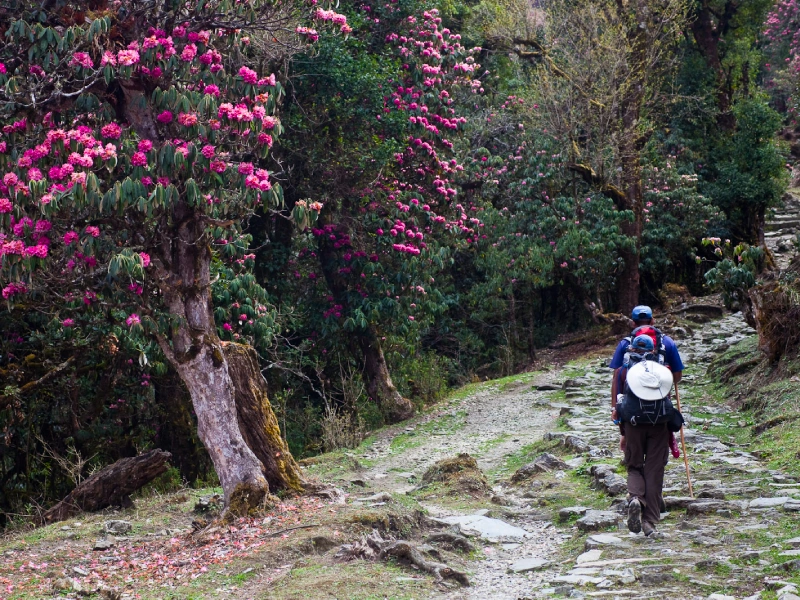
Ghandruk is a gateway to some of Nepal’s most iconic treks, suitable for all fitness levels. Popular routes include:
- Annapurna Base Camp Trek: A 7-12 day journey through diverse landscapes to the base of Annapurna I.
- Poon Hill Trek: A 3-5 day trek with sunrise views from Poon Hill (3,210m).
- Mardi Himal Trek: A 5-day trek offering solitude and stunning vistas.
- Khopra Danda and Mohare Danda: Emerging routes for off-the-beaten-path adventures.
Trekking Details
Permits: Required for all treks:
- ACAP: NPR 1,000 (SAARC), NPR 3,000 (others).
- TIMS Card: NPR 1,000 (SAARC), NPR 2,000 (others). Obtainable at Nepal Tourism Board offices in Kathmandu or Pokhara.
Guides and Porters: Guides cost $25-30/day, porters $20-25/day, enhancing safety and cultural insights.
Trails: Stone steps, paddy fields, and forests, with moderate ascents (highest point ~2,000m, minimal altitude sickness risk).
Best Trekking Seasons
- Spring (March-May): Blooming rhododendrons, mild temperatures (10°C-20°C), ideal for birdwatching.
- Autumn (September-November): Clear skies, vibrant festivals like Dashain and Tihar, temperatures 10°C-20°C.
- Avoid Monsoon (June-August): Heavy rain and landslides make trails slippery.
| Trek | Duration | Distance from Ghandruk | Highlights |
|---|---|---|---|
| Annapurna Base Camp | 7-12 days | 50 km | Glacier views, diverse terrain |
| Poon Hill | 3-5 days | 15-18 km | Sunrise at 3,210m |
| Mardi Himal | 5 days | Varies | Secluded, panoramic views |
How to Get There
Ghandruk’s proximity to Pokhara (50-55 km) makes it accessible:
By Road:
- Private Jeep: $25-35 from Hari Chowk, Pokhara, to Ghandruk (1.5-2 hours).
- Bus: From Nayapul (1-hour drive from Pokhara), buses run every 20 minutes.
Trekking:
- Start from Nayapul (4-5 hours) or Birethanti, passing rice fields and villages.
- Alternative starts: Ghorepani or Dhampus.
From Kathmandu:
- Flight to Pokhara (25-30 minutes, $100-150).
- Bus to Pokhara (6-7 hours), then proceed to Ghandruk.
- Roads may be challenging during monsoon due to landslides, so check conditions beforehand.
Accommodation and Food
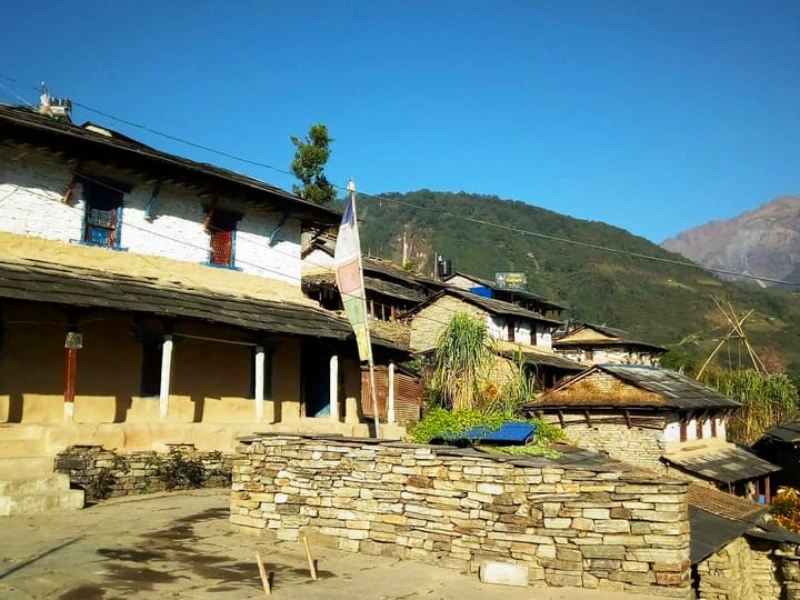
Accommodation
Ghandruk has over 60 hotels and lodges, accommodating ~1,200 visitors. Options include:
- Homestays: $10-15/night, offering cultural immersion and home-cooked meals.
- Teahouses and Lodges: $10-20/night, e.g., Snow Land A Traditional Lodge.
- Modern Guesthouses: $20-30/night, with amenities like hot showers and Wi-Fi (e.g., Mountain Lodges of Nepal – Ghandruk).
Food
Meals cost $3-7, featuring:
- Nepali Staples: Dal Bhat, Momos, Thukpa, Chow Mein.
- Gurung Specialties: Kodo ko Roti, Sikarni (yogurt dessert).
- Drinks: Local green tea, available in fields around Ghandruk.
Most lodges have micro-hydro-powered electricity and good mobile data coverage, though a two-pin adapter may be needed.
| Accommodation Type | Cost/Night | Amenities |
|---|---|---|
| Homestay | $10-15 | Cultural experience, basic facilities |
| Teahouse/Lodge | $10-20 | Shared bathrooms, hot showers |
| Guesthouse | $20-30 | Wi-Fi, attached bathrooms |
Tips for Travelers
- Packing: Layered clothing for variable weather, trekking boots, sunscreen, and a reusable water bottle.
- Cultural Etiquette: Dress modestly, ask permission before photographing locals, and respect religious sites.
- Safety: Stay hydrated, follow guide advice, and check weather forecasts.
- Sustainable Tourism: Support local businesses, minimize plastic use, and respect conservation efforts.
- Budgeting: Expect $200-300 for miscellaneous expenses (snacks, tips, permits).
Recent Developments
The COVID-19 pandemic hit Ghandruk’s tourism hard, but the community adapted by returning to agriculture and later attracting domestic travelers. As international tourism rebounds, Ghandruk continues to thrive, with new trekking routes like Khora Danda and Mohare Danda gaining popularity. The Annapurna Conservation Area Project remains pivotal, promoting eco-tourism and community development since 1986.
Conclusion
Ghandruk is a destination where nature and culture converge. Its Himalayan vistas, Gurung heritage, and trekking opportunities make it a standout in Nepal’s Annapurna region. Whether you’re hiking to Poon Hill, soaking in Jhinu Danda’s hot springs, or savoring a homestay meal, Ghandruk promises memories that last a lifetime. Plan your trip to experience this Himalayan gem’s warmth and wonder.
